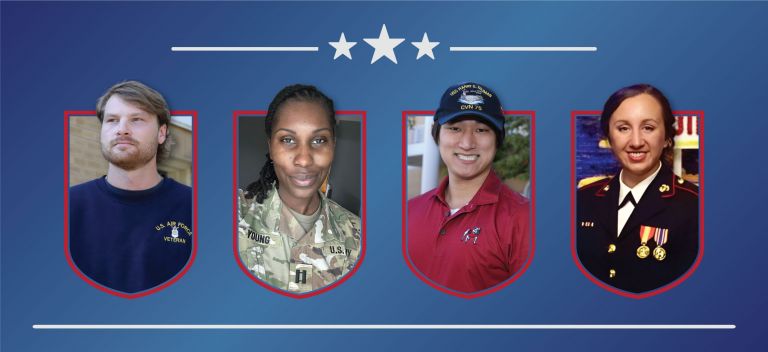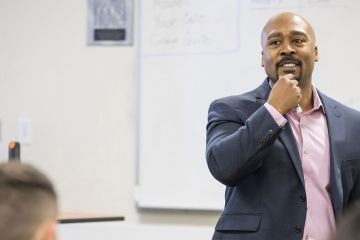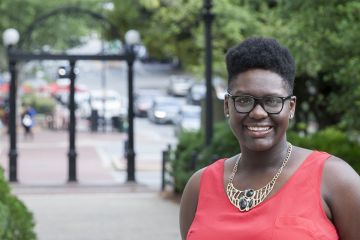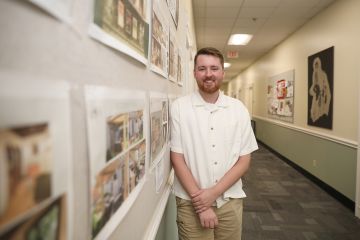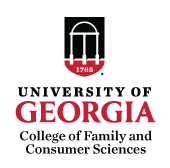FACS in the military
It’s about 6,000 miles from Bogart, Ga., to Incirlik Air Base in Turkey.
That’s where Clay Partridge found himself in his early 20s, far from home during a pandemic, reporting to a lieutenant colonel and surrounded by hostile forces.
When a nearby base was bombed, Partridge woke up to find several C-130 aircraft lined up on his base’s flight line ready to respond.
“I woke up that morning and updated my life insurance policy,” he said.
Fortunately, the threat didn’t materialize, and Partridge’s Air Force career proved to be transformative.
“I was happy to serve,” he said, “and I never regretted it because there’s no telling where I would be right now if I hadn’t.”
Partridge served five years in the Air Force in supply chain logistics, finishing his service at Spangdahlem Air Base in Germany. When he got out, his next step was to fulfill a childhood dream and enroll at the University of Georgia.
His path led him to FACS and the fashion merchandising major, a decision he came to after immersing himself in the European culture during his time in the military.
“They were very fashion forward,” he said. “And I saw a big opportunity to go into that field with my supply chain background.”
Partridge raves about the FACS program and professors. He has taken study away trips to both New York City and Peru and has received scholarships from the Georgia Soft Goods Education Foundation totaling $4,000.
He graduates this fall and is eager to launch his career.
“Our program is so much more than being in the classroom,” he said. “The professors really want to set you up for success after college.
Partridge is one of 18 veterans currently enrolled at FACS, including six undergrads and 12 graduate students who are pursuing online degrees.
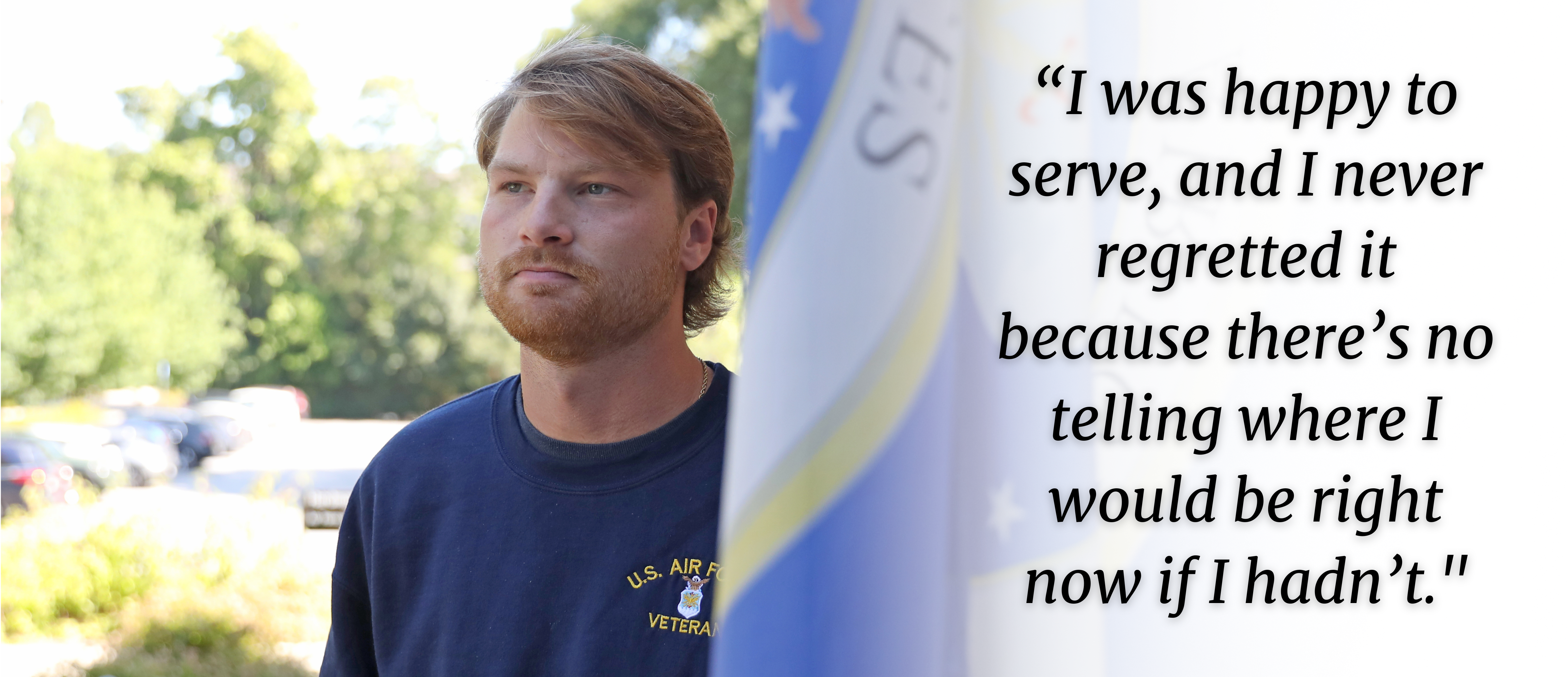
Here’s a look at a few FACS veterans:
Tianner Barnett
Tianner Barnett initially became interested in the military in high school as a member of the Air Force Junior ROTC program.
“When I was in ROTC, (the military) seemed perfect for me,” he said. “I liked how it was structured and organized, and I wanted to do something different.”
A native of nearby Madison, Barnett joined the Navy out of high school and soon began working on the flight deck.
He credited the military with helping him mature.
“You get thrown in and the training wheels are officially off,” he said. “You’re doing everything on your own.”
Now 29, Barnett is pursuing a master’s degree in financial planning through the UGA Double Dawgs program, having spent five years in the Navy as an aviation boatswain’s mate, equipment, or ABE.
Part of his journey to the field of financial planning was born out of personal experience with money-related issues.
Barnett began incurring a lot of debt during his time in the Navy. When he was discharged at the end of four years of service, he had accumulated about $20,000 in credit card debt.
“It was just horrendous watching that happen,” he said.

He took a couple different jobs after leaving the service. It was during his time as a bank teller that his life began a new trajectory, as customer interactions gave him insight into common financial problems.
“I saw how people were living paycheck to paycheck, taking a lot of payday loans,” he said. “It kind of opened my eyes.”
Taking note of his growing interest in finance, a colleague suggested Barnett enroll in the financial planning program. Using the G.I. Bill, he made his way to FACS and quickly discovered his passion.
“I knew this was exactly what I wanted to do,” he said.
During that time, he also signed on with a debt consolidation company that gave him “room to breathe” as he worked to get on better footing financially.
He’s now eager to use his own experience to help others climb out of similar situations. He will graduate with a master’s degree in 2027, pursuing the behavioral financial emphasis.
“I want to help people because I understand their struggles,” he said. “I know what it’s like to not know where your next meal is coming from and just seeing this never ending debt in front of your eyes. I want to help people do better for their future.”
Heather Brown
The night before boot camp, Heather Brown cried herself to sleep.
Just a few dizzying months after visiting a recruiter’s office in her native Alabama, she found herself in a hotel room wondering if she had made a big mistake.
“I had no phone, no form of connection, and I remember thinking ‘I don’t want to do this,’ ” she said. “I finally went to bed watching Forrest Gump and crying, telling myself it’ll be OK.”
The next day, Brown was on a bus with her head down and eyes closed, bound for the Marine Corps Recruit Depot at Parris Island, S.C.
She was 24 years old and looking for a change, having worked a few years as a certified medical assistant out of high school.
“I wanted to prove those who doubted me wrong and ultimately prove to myself that I'm stronger than I think I am," Brown said.
Brown survived boot camp and earned her Eagle, Globe and Anchor (EGA), the official emblem of the Marine Corps.
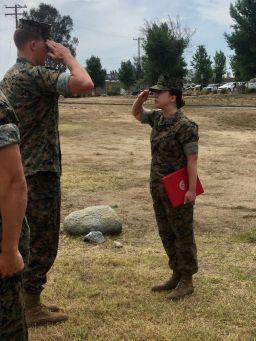
“It’s like a moment I can’t describe,” she said of the pride she felt. “It’s just such a beautiful moment that came with a lot of pain and heartache, and I wouldn’t take it back for anything. It changed everything about my life.”
Brown’s first duty station was in Okinawa, Japan, working in supply administration before finishing up her four years of service in Camp Pendleton, California.
Brown’s childhood passion for interior design eventually led her to the FACS furnishings and interiors program, where she said she fit in immediately.
“What stands out the most are the relationships I built,” she said. “Everything was super hands-on and all the faculty had an open-door policy and they meant it. They were just so passionate about teaching and sharing knowledge.”
Brown graduated in 2022 and began working as an interior designer with Peace Design in Atlanta, where the skills she learned as a Marine have proven useful. In other words, deadlines don’t faze her and customer feedback never hurts her feelings.
“It’s given me a thick skin and has helped me to stay cool under pressure,” she said, laughing. “It takes a lot to get me down or stress me out.”
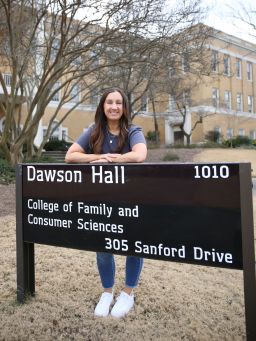
Shaquita Young
Shaquita Young came to UGA on a track and field scholarship in 2007 following a standout career at Oconee County High School.
Her life’s course would be dramatically altered during a study away trip to Washington, D.C., in 2009, where she met John Robertson, now a retired lieutenant colonel, and Jay Moughon, a retired colonel, during a tour of the Pentagon.
“From this visit, my interest in everything Washington, D.C., was sparked,” Young said.
By 2017, Young had two degrees from FACS and was a federal employee with the Social Security Administration, but considering a career as a military officer. She remembered Moughon and Robertson from the Pentagon trip several years earlier and reached out to them for advice.
“During my visit, we discussed my current position as well as my goals for the future,” Young said. “The amount of time both of them dedicated to me was overwhelming. I was a random student from UGA and they were investing hours into me on top of their personal and professional schedules.”
After Young joined the Army, their friendship deepened.
“I often did not know what day it was because all of my days would run together,” she said. “However, some days I would go to my phone and see an uplifting text message from Jay saying ‘Can’t wait to welcome you to the officer world’ or ‘Graduation is getting close, how is everything going?’ Receiving this support from someone who has been there and done that is very uplifting.”
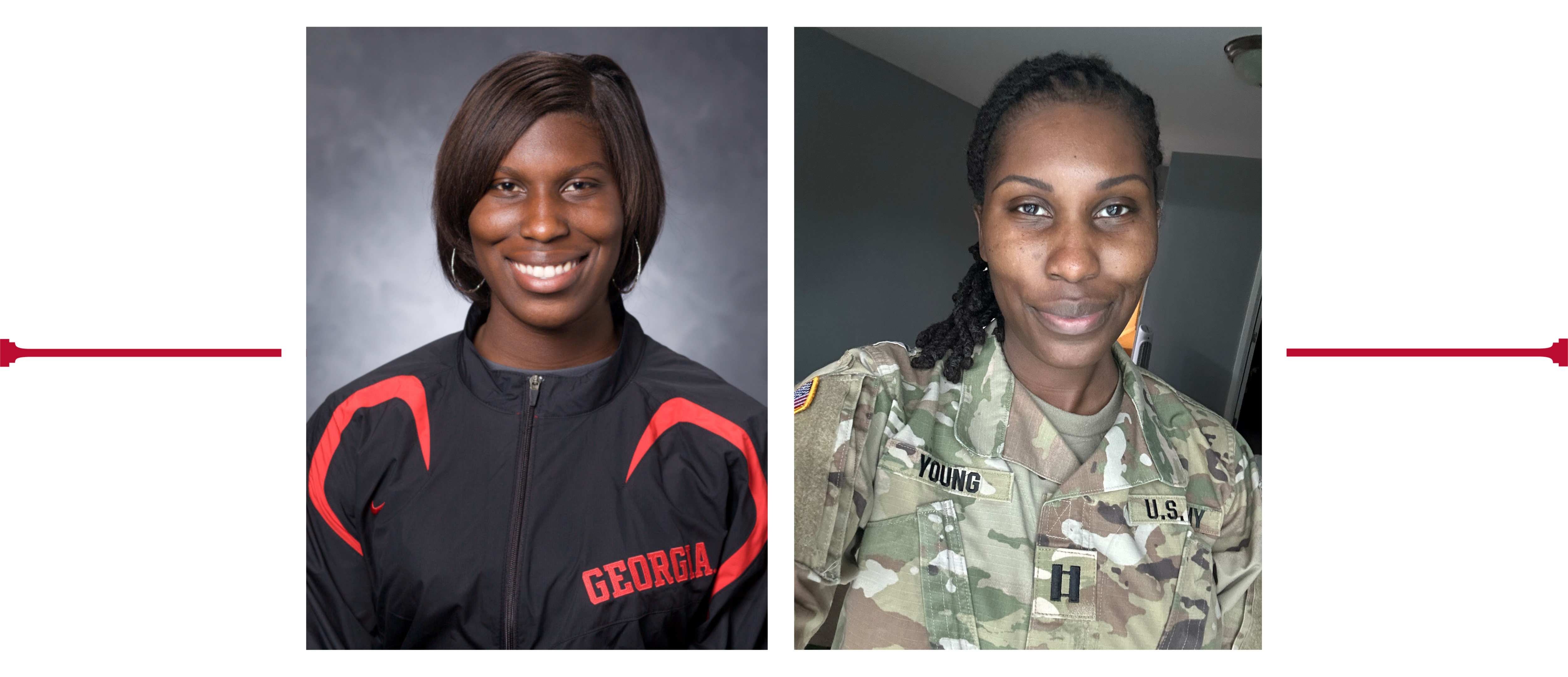
Here, Young reflects on her path and how FAS helped prepare her for a career in the Army.
Current position
Rank: Captain. Comptroller for 1st Multi Domain Task Force, Joint Base Lewis-McChord, Washington
What was your path to the military?
Although I come from a military family, my parents never pressured me into joining. I knew the opportunities that joining provided them and their reasoning, but never knew much beyond that. I attended college on a track scholarship and later enrolled in graduate school. Upon graduation, I moved to Minnesota in December 2013 to work at Ameriprise Financial Headquarters and later served as a benefit authorizer for the Social Security Administration Programming Center in Birmingham, Alabama. After year two, I quickly found myself on a plateau. I was able to do my job in my sleep, but the growth opportunities were limited due to various factors. I spoke with several mentors and close friends about possible opportunities and received unwavering support. I closely researched the opportunities and benefits during and after service as well as the risks and decided it was worth a shot.
What sparked your interest?
Everyone says if you like to travel, you should join the Army. I guess depending on what unit you're assigned to, this could be true. Upon joining my current unit, I was on a trip to Honolulu within a week and preparing for another trip overseas. Before this, I had never traveled for work. The main reason for me was opportunity. I’ve had the opportunity to receive industry training, competitive benefits and the opportunity to network both professionally and personally. As a professional student, this is a position you continue to learn in.
I’ve held the following roles since joining: Budget Officer for 7th Infantry Division, Comptroller for 42nd Military Police Brigade. In all roles I’ve been responsible for advising the unit commander on all fiscal matters while being knowledgeable on various sources of funds, their authorized uses, and the unit’s overall execution status. I’ve assisted in managing annual budgets from $3 million to $275 million.
Describe a typical day
Accountability at 0600 to ensure everyone is present and safe, physical training 0630-0800, personal hygiene and breakfast 0800-0930, work 0930-1700. My current assignment has a high operational tempo. I often find myself trying to resolve complex situations legally and quickly, which is equally satisfying and stressful.
What would you say to FACS students considering a career in the military?
I’d say consider exactly what you want and determine if the pros outweigh the cons. I have had a very non-traditional career path. My commissioning source (OCS) is very competitive. Out of 129 individuals in my class, there were only two positions for finance. While you are competing in everything from physical fitness tests, obstacle courses, written tests, military history, leadership assessment, peer evaluations, etc., all this determines your position for picking your job. While you do get to rank your jobs, you ultimately do not get a say, so at the very end you’re taking a gamble on the next 3 1/2 years of your life. I am fortunate to have branched finance, where I had a strong background. I have had a regular 9-5 schedule as a support branch and have not spent a single day in the field since March 2020. There are some downsides. During initial training, it can be physically taxing on your body, for 22 weeks straight with required training of building you up into a soldier. Even though I consider myself an athletic person, some things you just can’t prepare for.
What reflections can you share about your time at FACS?
During undergrad, I was balancing being a student and an athlete. I was never a bad student, but I didn’t have the time to pour into my academics due to time constraints. However, when I became a graduate student, I flourished. I served as a teaching assistant for several professors, which provided me with a monthly stipend as well as serving as a tutor for student athletes.
I also studied abroad in Costa Rica and London; worked on a publication that was published in Housing and Society (2015); provided financial counseling at low to no cost through the ASPIRE Clinic and completed research data involving current and former UGA athlete to assess their financial literacy.
How did your time at FACS help prepare you for your career?
It provided me with the network to connect with individuals across multiple branches of the military and of various ranks. Dr. Anne Sweaney taught me the importance of networking. Everyone knows Dr. Sweaney and Dr. Sweaney knows everyone! It also taught me the importance of community. You don’t get anywhere you’re going alone and there are always people there to support you, even if you don’t know it. Find a mentor early when you’ve identified a passion and utilize them as best you can.
My dynamic duo is John Robertson and Jay Moughon. We met back in 2009 during my Washington D.C. tour with Dr. Sweaney. I met them on our tour of the Pentagon and could’ve never imagined our friendship would have blossomed into the way it has. After staying in touch and visiting over the years, these two became invested in my personal growth and success. Jay also wrote a profile on me that was presented at the Pentagon. By the time I showed up to the finance schoolhouse for training, the commandant was already aware of me and my background. Since joining, we’ve all stayed in touch. John and I attended the 2022 national championship together in Indianapolis and have lunch when I’m home.
Joining the military has allowed me to connect with my parents through shared experiences while serving. I never would have found myself living in Washington state, a lover of national parks or becoming a snowboarder. I’m immensely grateful for the security and opportunities this career path has offered me.
